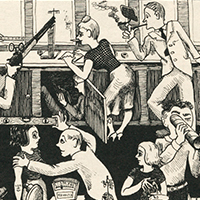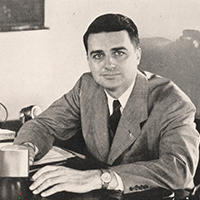In the same manner that Land thought about the core purpose of his products emanating from essential human needs, he approached the welfare of his employees in deeply humanistic ways, inspiring a sense of purpose and a desire to contribute to meaningful work. Business historian Harold Livesay writes that Land "advocated a belief in the harmony and symbiosis among work, virtue, profit, beauty, technology, and progress."32 Addressing the future of industrial research in 1944, Land affirmed, "All [employees] will regard themselves as labor in the sense of having as their common purpose learning new things and applying that knowledge for public welfare. . . . Each individual will be a member of a group small enough so that he feels a full participant in the purpose and activity of the group. His voice will be heard and his individuality recognized."33
A dreamer and inventor himself, Land realized researchers needed time to solve problems in an environment without distractions: "I think the important and nearly impossible projects such as we set for our goal require prolonged periods of intensive concentration. . . . It is simultaneous mastery of a hundred interacting variables that is the glory of the kind of scientist we are talking about for our scientific companies."34 He observed that the downfall of many scientific enterprises occurred because "just the time when a man's talent might be maturing, he is drawn off into a variety of so-called managerial activities. It is impossible for the long, long thoughts, the profound thoughts, the unconscious accumulation of insights, to come into being after these serious digressions into management."35 Failure, Land believed, represented a critical part of the creative, scientific process. "An essential aspect of creativity is not being afraid to fail," he asserted. "Scientists made a great invention by calling their activities hypotheses and experiments. They made it permissible to fail repeatedly until in the end they got the results they wanted."35
William McCune characterized the interdisciplinary nature of a small, research-based company like Polaroid: "When you have…a relatively small company and a group of people who are concerned with something that is the basis for building that company, usually you have a free flow of information of all kinds through that group. . . . The technical aspects and many of the business aspects are . . . part of the every day discussions, so people are living and breathing the whole darn thing."37 Polaroid encouraged its employees to observe both production and research and to collaborate with colleagues in other divisions. The company implemented a "sun and satellite" system in which, Land explained, "someone is a ‘sun' concentrating on his particular problem and those around him are ‘satellites.' Many satellites are suns in other domains and I might be a satellite around another sun."38
Polaroid tapped into the talented pool of graduates from Harvard and MIT as well as Smith College, many of whom were recommended by Clarence Kennedy. The company routinely employed women in top-level research positions, an unusual practice for the time. Appreciating the role visual perception played in judging laboratory results, Land sought out employees who had backgrounds in chemistry as well as an interest in the humanities and art. McCune noted that Land "was a Renaissance person if there ever was one. . . . His interest in the visual arts, in literature, in theater, in all forms of the intellectual activities . . . was something that I think he maintained all his life, and I think that as a result that generated an environment which attracted creative and interesting people from a whole variety of disciplines, rather than just science."39
Polaroid instilled a further sense of common purpose and camaraderie through the establishment of an employees' organization, the Peers Club, where staff participated in activities including sports teams, the company band, dances, holiday skits, and publication of the company's in-house periodical, the Gazette. Polaroid provided its employees with an extensive package of benefits that included sick days and vacation time, retirement benefits, and educational assistance for courses within and outside of the company. Land's support of education centered on his belief that "the world is a scene changing so rapidly that it takes every bit of intuitive ability you have, every brain cell each one of you has, to make the sensible decision about what to do next."40 The progressive practices and generous benefit package established by Polaroid, one of the leading employers of the area, enhanced its reputation as a desirable place to work. Former employees created their own alumni association as well to sustain their ties to and memory of the company.
- 31. Land, "Research by the Business Itself," 1.
- 32. Harold C. Livesay, American Made: Men Who Shaped the American Economy (Boston: Little, Brown and Company, 1979), 276.
- 33. Land, "Research by the Business Itself," 1–2.
- 34. Edwin H. Land, "On Some Conditions for Scientific Profundity in Industrial Research," Charles F. Kettering Award Address, June 17, 1965, Washington, DC, Edwin H. Land speech files, Baker Library, Harvard Business School.
- 35. Ibid, 7.
- 36. Land quoted in Sean Callahan, "Dr. Land's Latest Bit of Magic," Life 73, no. 17 (October 27, 1972): 48.
- 37. William J. McCune, Oral History Project, Interviews with William J. McCune, Chairman, Polaroid Corporation, June–August 1990, 56, Oral history files, Polaroid Corporation Records, Baker Library, Harvard Business School.
- 38. Land quoted in Kostelanetz, "A Wide-Angle View," 52.
- 39. McCune, Oral history files, 142-143.
- 40. Edwin H. Land, "Address to Polaroid Corporation Employees," June 25, 1958, in McElheny, Insisting on the Impossible, 199.





